Are you in the middle of a DIY home improvement project and have run into problems trying to remove dried concrete from concrete? Don’t worry, you are not alone! Every weekend home handyman or woman has faced this problem at some point.
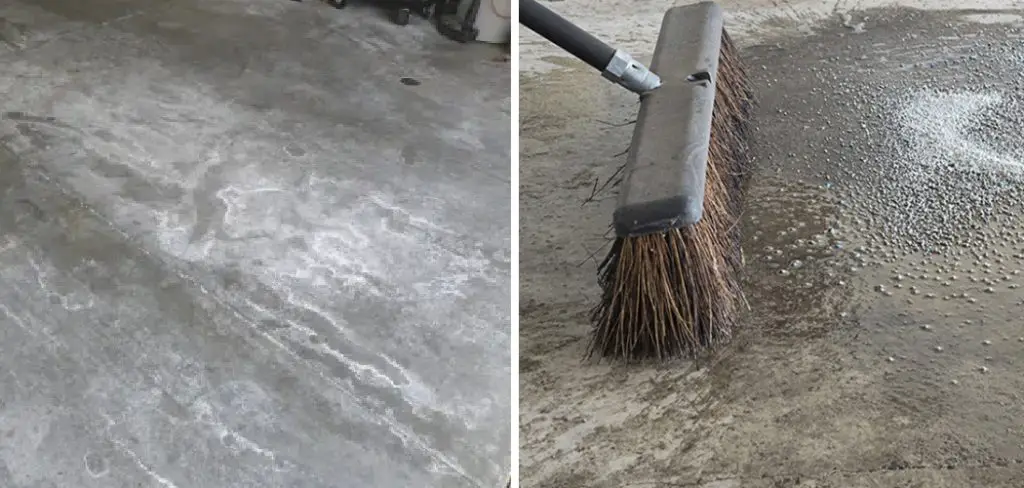
The good news is that it’s actually quite easy to get rid of if you know what
steps to take. In this blog post, we’ll walk you through exactly how to remove dried concrete from concrete so that your project can stay on track. Read on for our step-by-step breakdown!
Why is It Important to Remove Dried Concrete From Concrete?
1 . To Restore the Aesthetic Appeal of Concrete
Concrete is a popular choice for many homeowners due to its durability and low maintenance requirements. However, when dried concrete forms on the surface, it can create an unappealing appearance that detracts from the overall look of your property.
This is especially true if the concrete in question is part of a driveway, patio or walkway where it is highly visible. Removing dried concrete from concrete surfaces can help restore its aesthetic appeal, making your property look cleaner and more visually appealing.
2 . To Prevent Damage to Concrete
Concrete may seem like a tough material, but it can be damaged by the presence of dried concrete. If left for an extended period of time, the hardened concrete can start to chip away at the surface of your concrete, causing cracks and other forms of damage.
These cracks can be unsightly and if left untreated, can lead to larger structural problems down the line. By removing dried concrete from concrete surfaces, you can prevent further damage and extend the lifespan of your concrete.
3 . To Avoid Safety Hazards
Dried concrete on concrete surfaces can create safety hazards for anyone walking or driving on them. The rough and uneven texture of dried concrete can cause people to trip, especially if the concrete is in a high-traffic area.
Furthermore, if the dried concrete is located on a driveway or sidewalk, it can become slippery when wet, posing a risk of falls and injuries. By removing dried concrete from these surfaces, you can ensure the safety of yourself and others.
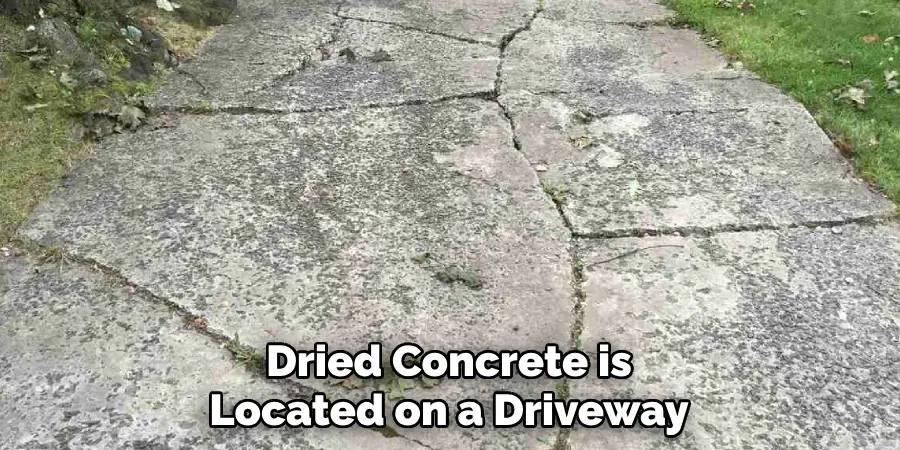
4 . To Prepare for Future Maintenance or Repairs
If you plan on doing any maintenance or repairs on your concrete surfaces in the future, it is important to remove dried concrete beforehand. Dried concrete can make it difficult for new materials to adhere properly, leading to poor results and potential failure of your repair work. By removing dried concrete, you can ensure a clean and smooth surface for any future maintenance or repairs.
How to Remove Dried Concrete From Concrete in 5 Easy Steps
Step 1: Gather Your Materials
Before you start removing the dried concrete, gather all the necessary materials. This will make the process much smoother and faster. Here are some of the things you’ll need:
- Stiff-bristled brush
- Scraper (plastic or metal)
- Water
- Lemon juice or vinegar
- Bucket or spray bottle
Step 2: Scrape off the Dried Concrete
Using a scraper (plastic or metal), gently scrape off as much of the dried concrete as you can. Be careful not to damage the concrete surface underneath. Also, make sure to wear protective gear like goggles and gloves to avoid any injuries.
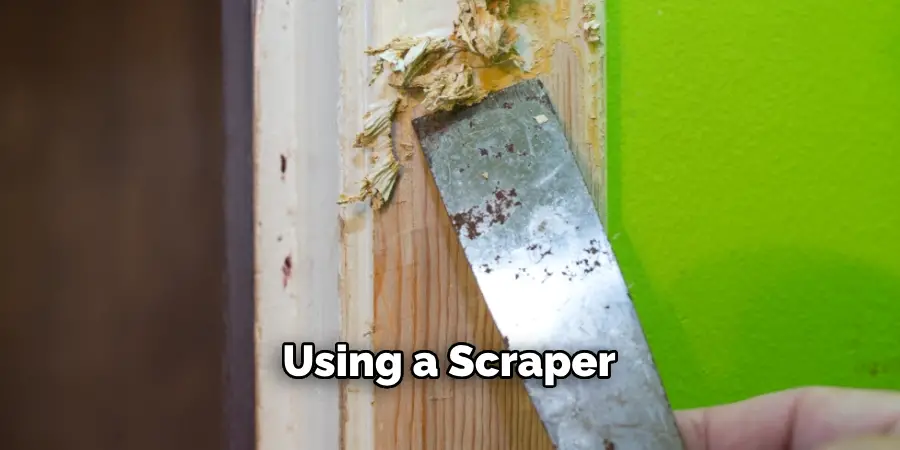
Step 3: Apply Water
Next, soak the dried concrete with water. You can either use a bucket of water or a spray bottle. Let the water sit for a few minutes to soften the concrete. Also, make sure to keep the concrete wet throughout the process.
Step 4: Use a Stiff-Bristled Brush
After the dried concrete has been soaked with water, use a stiff-bristled brush to scrub off the remaining bits. This may take some time and effort, but be patient and thorough. You can also use lemon juice or vinegar along with water for better results.
Step 5: Rinse and Repeat
Once you’ve scrubbed off all the dried concrete, rinse the area with clean water. If there are still some stubborn bits left, repeat the process until all the concrete is removed. Afterward, dry the surface completely with a towel or let it air dry.
Some Extra Tips to Remove Dried Concrete From Concrete
1 . Do Not Use Harsh Chemicals
Harsh chemicals can damage the concrete surface and weaken it. It is best to avoid using them, especially if you have a delicate or expensive concrete surface. Instead, opt for milder solutions like vinegar or baking soda mixed with water.
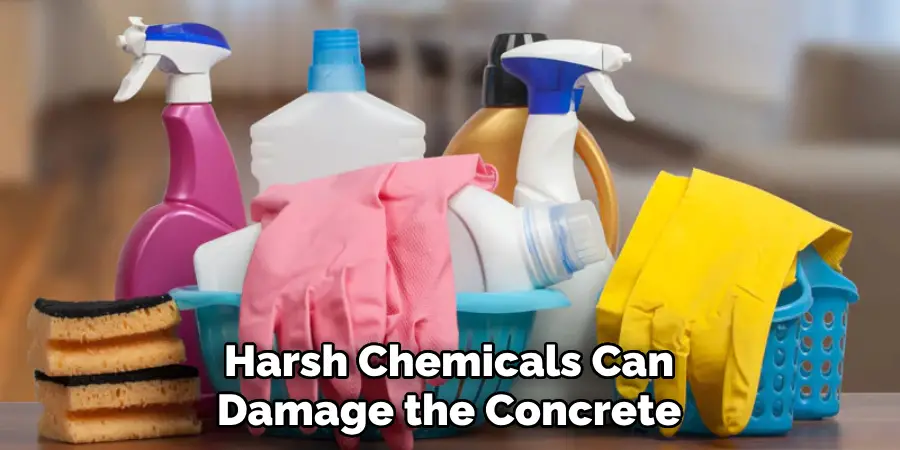
2 . Try Soaking The Affected Area
If you are dealing with a larger area of dried concrete, it might be helpful to soak the affected area with water before attempting to remove it. This will soften the hardened concrete and make it easier to scrape off.
3 . Use Hot Water
If soaking doesn’t work, try using hot water instead. The heat will help break down the concrete and loosen its grip on the surface. Remember to use protective gear as hot water can cause burns.
4 . Use a Pressure Washer
For outdoor surfaces, a pressure washer can be an effective tool for removing dried concrete. The high-pressure water spray can blast away the hardened concrete without damaging the surface underneath.
5 . Try Mechanical Tools
If all else fails, you may need to use mechanical tools like a chisel or jackhammer to remove the dried concrete. These tools can be quite powerful, so make sure to use them carefully and wear appropriate safety gear.
6 . Prevent Future Build-Up
To prevent dried concrete from forming on your surfaces in the future, it is important to clean up any spills or drips immediately. You can also apply a sealant to your concrete surface to make it more resistant to concrete build-up. Regular maintenance and cleaning can also help prevent the problem.
Frequently Asked Questions
What Precautions Should I Take When Removing Dried Concrete From Concrete?
When removing dried concrete from concrete, it is important to take certain precautions to avoid damaging the surface or causing harm to yourself. Here are some tips to keep in mind:
- Always wear protective gear such as gloves, safety glasses, and a mask to protect your skin, eyes, and lungs from any chemicals or debris.
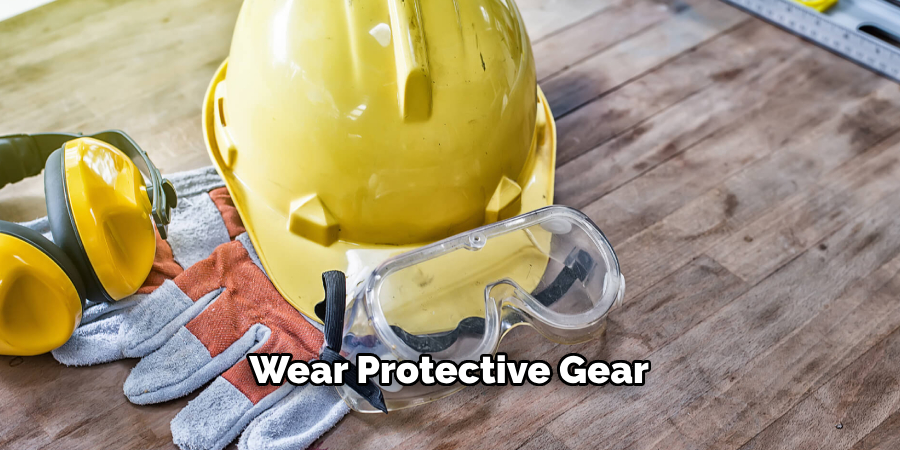
- Work in a well-ventilated area to avoid inhaling any fumes.
- Use the proper tools and equipment, such as a scraper or pressure washer, depending on the severity of the dried concrete. Using the wrong tools can cause further damage to the surface.
- Test a small inconspicuous area first before attempting to remove all of the dried concrete. This will help you determine the best method and avoid any potential damage.
- Follow the instructions for any chemical cleaners carefully, and make sure to rinse the area thoroughly after use.
- If using a pressure washer, start with a low-pressure setting and gradually increase if needed. Be careful not to aim the stream directly at the concrete surface as it can cause pitting or erosion.
Can I Use Household Products to Remove Dried Concrete From Concrete?
Yes, there are some household products that can be effective in removing dried concrete from concrete surfaces. These include white vinegar, baking soda, and even Coca-Cola.
However, it is important to note that these methods may not work for more stubborn or thick layers of dried concrete. Additionally, always test a small area first and use caution when using any household products as they may contain harsh chemicals.
What Are Some Professional Methods for Removing Dried Concrete From Concrete?
For tougher cases, it may be best to seek professional help in removing dried concrete from concrete surfaces. Some common methods used by professionals include sandblasting, shot blasting, or using chemical strippers.
These methods are effective in removing thick layers of dried concrete, but they do require specialized equipment and training. It is important to hire a reputable and experienced professional when considering these methods.
Are There Any Alternative Methods for Removing Dried Concrete From Concrete?
Yes, there are alternative methods that can be used to remove dried concrete from concrete surfaces. These include using a poultice made from materials such as sawdust, clay, or even laundry detergent. The poultice is applied to the dried concrete and left to sit for several hours before being scraped off. This method may take longer than others, but it is a more environmentally friendly option and does not require harsh chemicals.
Conclusion
In conclusion, when it comes to removing dried concrete from concrete surfaces there are many strategies that can be used. Depending on your situation and the amount of effort you are willing to put in, one of these approaches may be better suited for you than the others.
From using chemical cleaners to scratchers or wire brushes, these methods will help you remove the dried concrete depending on where and how old it is.
Now you know how to remove dried concrete from concrete! Not only will this make the job easier but also leave a lasting impression on those who take notice. If after trying all these techniques the stubborn concrete remains, calling a professional is always a good idea as they have effective industry tools available at their disposal. So next time dry concrete ruins your plans, remember that these steps can help restore the surface back to its former beauty!
